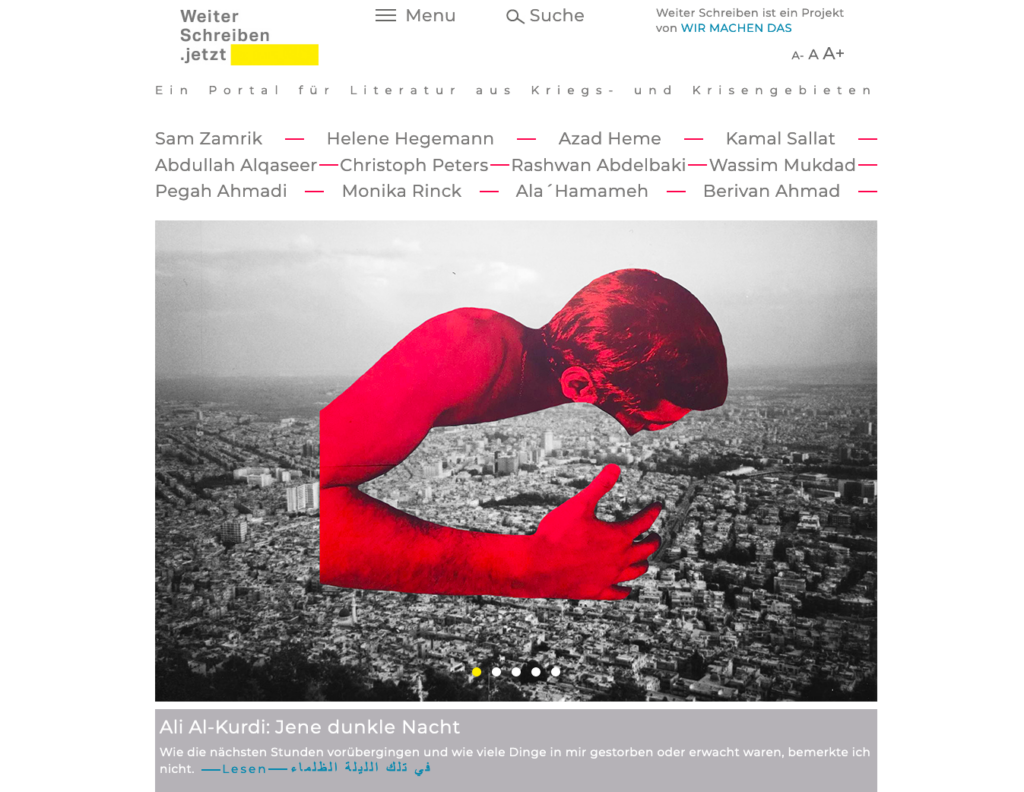
The latest installment in our Mission Possible series of reflections on the future of German Studies comes courtesy of Dr. Jule Thiemann of the University of Hamburg’s Institut für Germanistik, who argues that the field must turn towards expanding the field of canonical literature to include postmigrant engagement with small forms, digital modes of writing ranging from social media posts to the online curation of poetry and prose by refugees. She writes that centering cultural production from marginalized and precarious voices requires challenging predominant categories of transnational and refugee literature currently delimited by institutions of publication, distribution, and criticism.
You can read this post in the original German here.
Digital Narratives of Flight and Postmigrant Perspectives:
Marginalized Voices – Marginalized Forms?
Literary writing by authors who have fled to Germany since the so-called “refugee crisis” in 2015 has received increased interest from German society and the literary establishment, and has been promoted by cultural institutions and state initiatives – but all too often remains beyond the boundaries of the visible: The texts, some of which are written in an autofictional style, oscillating around themes such as flight and expulsion, arrival and new beginnings, often appear as short prose pieces, e.g. essays, letters, blog posts, feuilletons, graphic novels, comics (e.g. Alphabet des Ankommens at: https://alphabetdesankommens.de) on digital platforms whose agenda is to present the literature of refugees (e.g. the project Weiter Schreiben at: https://weiterschreiben.jetzt) or in social media, e.g. on Twitter or Facebook.
However, only a few authors have (so far) managed to take the leap into an established publishing house: Established authors include Abbas Khider, Saša Stanišić, and Senthuran Varatharajah. The lyrical work of Lina Atfah, a poet who fled Syria, was also recently recognized. Once this “leap” has been taken, the visibility that a book contract brings changes not only the position of the writers, but also their texts: Before they are published, they go through several rounds of editing and proofreading, and are often translated from the author’s first language into German. After translation, editing and proofreading, the texts appear on the German book market with labels such as “transnational literature,” “intercultural literature” or “refugee literature.” Through their inclusion in a publishing program, a mechanism of establishing and, above all, valorizing texts by an authority takes hold.
Digitally published escape narratives (Tweets, blog posts, letters, etc.), on the other hand, can often be formally assigned to an established literary genre: the “small form.” The negotiation of small forms in literary studies and literary theory is currently experiencing a renaissance (e.g. the DFG Research Training Group Kleine Formen at: http://www.kleine-formen.de) and can be understood as a theoretical framing for the investigation of these digital short texts. In this sense, it should be asked whether those narratives do not only establish new modes of writing, but also new approaches to (self-)publication, and with that depict a postmigrant, ephemeral reality.
Thus, German studies must also face the question of whether their curriculum is currently failing to examine digitally published short texts as new forms of postmigrant writing: For are online-published, non-edited texts, which (if at all) still have a long way to go before they are received by a larger audience (and only a few will make it onto the bestseller lists), not an important literary testimony OF the present that deserves scholarly consideration? What is the reach of these digital prose pieces, and can they not achieve much greater visibility precisely because of their positioning on the Internet, due to their digital, unrestricted distribution? And what happens to such texts that are initially published exclusively digitally, but are soon printed in the feuilleton or published in anthologies? These questions will occupy researchers in German Studies in the coming decades.
In this context, a focus of future literary and cultural studies analyses could be the examination of the self-image of the writers referred to as ‘refugee authors’ by publishers and the feuilleton, e.g. autofictive and metapoetological commentaries, rejection and reclaiming of attributions and labels as productive procedures, etc. The texts can be read as experimental arrangements and artistic self-questioning, in the context of which the authors establish themselves in a new country, a new city, and not least in a new literary landscape.
Why German Studies today? Because we as scholars have a responsibility to explore new literary forms and processes of the present, even beyond established publication channels. Only if German Studies opens up to postmigrant, digital modes of writing can it do justice to the new artistic dynamics and the fast pace of literature at the beginning of the 21st century.
References
Alphabet des Ankommens https://alphabetdesankommens.de (21.02.2021)
DFG-Graduiertenkolleg Literatur- und Wissensgeschichte kleiner Formen http://www.kleine-formen.de (21.02.2021)
Weiter Schreiben https://weiterschreiben.jetzt (21.02.2021)


